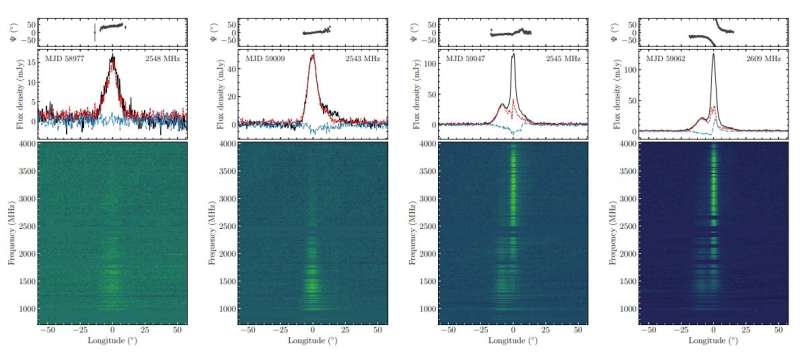December 3, 2020 report
Observations unveil dynamic magnetosphere of the magnetar Swift J1818.0−1607

Using the Parkes radio telescope, astronomers have investigated a radio-loud magnetar known as Swift J1818.0−1607. Results of these observations, providing more insights into the properties of this magnetar, unveiling its highly active and dynamic magnetosphere. The findings are reported in a paper published November 25 on the arXiv pre-print server.
Magnetars are neutron stars with extremely strong magnetic fields, more than quadrillion times stronger than the magnetic field of our planet. Decay of magnetic fields in magnetars powers the emission of high-energy electromagnetic radiation, for instance, in the form of X-rays or radio waves.
Swift J1818.0−1607 is a recently discovered galactic magnetar with a spin period of about 1.4 seconds and magnetic field strength at a level of some 250 trillion G. It is the fastest rotating soft gamma-ray repeater yet detected. Follow-up observations soon after it was found revealed that the source is radio-bright, making it only the fifth radio-loud magnetar so far identified.
Now, a new study of Swift J1818.0−1607 recently conducted by a team of astronomers led by Marcus Lower of Swinburne University of Technology in Australia, sheds more light on the nature of this magnetar and its magnetosphere. The research is based on the data obtained by the Commonwealth Scientific and Industrial Research Organisation's (CSIRO) Parkes 64-m radio telescope.
"In this work, we explore the spectral, temporal and polarimetric properties of Swift J1818.0−1607 across the 3.3 GHz bandwidth of the Ultra-Wideband Low (UWL) receiver system of the CSIRO Parkes 64-m radio telescope covering eight epochs after its discovery in March 2020 until October 2020," the scientists wrote in the paper.
The observations revealed that Swift J1818.0−1607 showcases significant temporal profile evolution, including the emergence of a new profile component with an inverted spectrum, two distinct types of radio emission mode switching, and the appearance and disappearance of multiple polarization modes. These results show that the magnetar possesses a highly active and dynamic magnetosphere following its 2020 outburst.
The astronomers noted the phenomena observed on Swift J1818.0−1607 are likely triggered by ongoing reconfiguration of the plasma content and electric currents within the object's magnetosphere. However, X-ray observations of this magnetar, combined with further radio monitoring are required to confirm this hypothesis.
Furthermore, the researchers added that Swift J1818.0−1607 is seen at an angle of about 99 degrees from the spin axis, and its magnetic and rotation axes are misaligned by around 112 degrees. They also found a flipping of the position angle swing, what is assumed to be due to highly intermittent switching of the emission region between a more active 'primary' and less active 'secondary' starspot of the magnetar. Therefore, the authors of the paper propose continued monitoring of Swift J1818.0−1607 at radio wavelengths, in order to better understand such behavior of this source.
More information: The dynamic magnetosphere of Swift J1818.0−1607, arXiv:2011.12463 [astro-ph.HE] arxiv.org/abs/2011.12463
© 2020 Science X Network



















